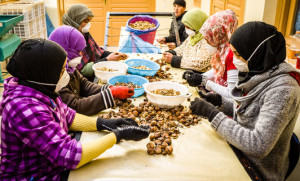Ghana Web
Morocco, El Haouz province: 60 thousand fruit trees to be planted and distributed at Jewish sacred site as part of High Atlas Foundation One Billion Tree Campaign.
At midday on Monday, February 9th, 2015, the honorable governor of the province of El Haouz, Mr Youn’s El Bathaoui, together with local community members and representatives of the Jewish community of Marrakesh-Essaouira, will participate in a very special fruit tree distribution and planting event.
30 thousand seeds and saplings are to be planted and the same number of 2-year-old trees olive, fig, pomegranate and lemon are set to be distributed to local farmers. The trees have been raised at the community nursery at Akriach, just south of Marrakesh, established by the High Atlas Foundation (HAF) on land that has been lent by the Jewish community of Marrakesh-Essaouira. The nursery is adjacent to the tomb of Rabbi Raphael Hacohen, one of several hundred Jewish sacred sites located throughout Morocco.
The High Atlas Foundation is a Moroccan-US non-governmental organization founded fifteen years ago by former Peace Corps volunteers, including its president, Dr. Yossef Ben-Meir. A year ago the foundation launched its One Billion Tree Campaign a continuation, at an accelerated pace, of its successful project involving a million trees, with the aim of establishing a billion new fruit trees and medicinal plants throughout the Kingdom. Species planted are indigenous to Morocco; nurseries are managed entirely on organic lines by local communities.
The broader goal is to cease subsistence agricultural practices that trap communities in a cycle of rural poverty and to develop the local and national economy through a variety of initiatives from community-managed tree nurseries to the deliver of organic product to global markets, cooperative-building, training, and reinvestment in human development projects. Additionally, the land management strategies put into place prevent erosion and desertification.
Land is made available by a diverse variety of interested parties including private individuals, national government bodies, municipalities, educational establishments, cooperatives, women’s associations and cultural bodies, one such being the Jewish community of Marrakesh-Essaouira, under its president, Mr. Jacky Kadoch. With the successful establishment of the pilot scheme at Akriach, it is hoped that many more of these cultural sites, with their adjoining arable land, will be utilized in the future. Indeed, the Moroccan Jewish community has already dedicated an additional six parcels of terrain in four provinces and is determined to provide more as funding for seeds, water infrastructure and training for the local farmers becomes available.
Cultural preservation and celebration that leads to sustainable human development is the twin approach adopted in Morocco and this innovative project, linking Moroccan Muslim farming families and the country’s Jewish community embodies both aims. In this spirit we welcome your participation and collaboration to make further progress with these two essential goals for the benefit of Moroccan farming families today and for the whole nation, to help enhance its rich cultural heritage in the future.
HAF’s president Dr. Ben-Meir describes further: The Kingdom of Morocco could be the only place in Africa and the Middle East where local Muslim and Jewish collaboration that helps end rural poverty through the creative use of cultural resources is promoted and is taking place. The upcoming gathering with Governor El Bathaoui and community members is an event that showcases the unifying achievement of the Akriach tree nursery as well as the support available to scale up this human development initiative across the nation.
Source: High Atlas Foundation








